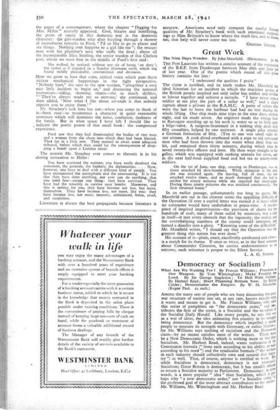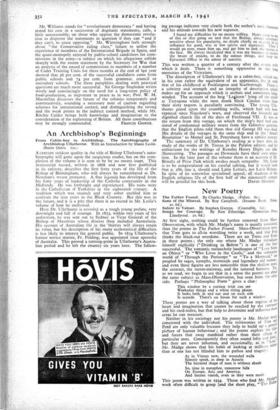Democracy or Socialism ?
What Are We Waiting For ? By Francis Williams ; Freedom la Our Weapon. By Tom Wintringham; Make Fruitful tha Land. By Sir George Stapledon; To Hell With Cultun. By Herbert Read ; Start Planning Britain Now. By Riidne Calder ; Democratize the Empire. By W. M. maemillia (Kegan Paul. is. each.) AMONG the many sets of people who are busy discussing the post- war structure of society one set, at any rate, knows exactly Whet it wants and means to get it. Mr. Francis Williams, who cal this series of pamphlets on " the democratic order," and cam' tributes the first of the series, is a Socialist and the ex-editor d the Socialist Daily Herald. Like many people, he sees this of as a war of ideas, the idea animating this country in its struggle being democracy. But the democracy which impelled a united people to measure its strength with Germany, or rather Nazism- for Mr. Williams says nothing of racialism and the Herrennolll claim—by no means satisfies most of the writers. There mast be a New Democratic Order, which is nothing more or less thall Socialism. Mr. Herbert Read, indeed, wants realisation of tb,e_ Communist formula (" from each according to his ability, to ego according to his need ") and the syndicalist formula (" the worked in each industry should collectively own and control that Sul& try ") as well. That, of course, anyone is entitled to want. But while Socialism is democracy, democracy is not necessarflf, Socialism; Great Britain is democratic, but it has steadily refits: to return a Socialist majority to Parliament. Democracy, words, is a more popular " idea " than Socialism, which is Zet,: haps why " a new democratic order," not " a Socialist order,'" P the professed goal of the more abstract contributors to the sates' Mr. Williams, Mr. Wintringham and Mr. Herbert Read.
Mr. Williams stands for " revolutionary democracy.' and having stated his case in a succession of dogmatic statements, calls, a little unreasonably,--on those who oppose the democratic revolu- tion to disprove the statements in question if they can " and if they can't, to cease opposing." Mr. Wintringham feels strongly about " the Conservative ruling class," failure to utilise the experience of members of the International Brigade in Spain, and the quasi-monopoly enjoyed by public-school candidates for com- missions in the army—a subject on which his allegations collide sharply with the recent statement by the Secretary for War that an analysis of the award of commissions to members of a number of Cadet Training Units for three months at the end of last year showed that 26 per cent. of the successful candidates came from public schools and 74 per cent. from grammar, council or secondary schools. The three pamphlets dealing with practical questions are much more successful. Sir George Stapledon writes wisely and convincingly on the need for a long-term policy of food-production, as important in peace- as in war; Prof. W. M. Macmillan discusses the future of the colonies temperately and constructively, sounding a necessary note of caution regarding schemes for international control, and distinguishing the strong and the weak points in the indirect control method, while Mr. Ritchie Calder brings both knowledge and imagination to the consideration of the replanning of Britain. All three contributions may be strongly commended. FRANCIS GOWER.































 Previous page
Previous page